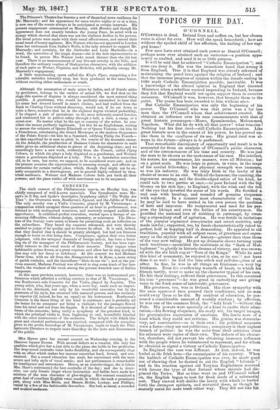CONCERTS.
The sixth concert of the Philharmonic season, on Monday last, was chiefly composed of well-known materials. The Symphonies were, Mo- zart's in E flat, and Spohr's descriptive Symphony called "Die Weihe der Tone": the Overtures were, Beethoven's Egmont, and the Jubilee of Weber. The only novelty was a Violin Concerto, played by M. Vieuxtemps; a composition which occupied three.quarters of an hour in performance, was listened to with undisguised weariness, and narrowly escaped audible dis- approbation. It exhibited perfect execution, wasted upon a farrago of un- meaning difficulties, without design, symmetry, or coherence. The Direc- tors of the Society were much to blame for permitting such an infliction on the subscribers. They heard the concerto rehearsed, and were thereby enabled to judge of its quality and to foresee its effect. It is said, indeed, that they desired that it should be greatly abridged, but had not firmness enough to insist on this being done. Compliance, against their own better judgment, with the arrogant demands of foreign artists, has been a beset- ting sin of the managers of the Philharmonic Society, and has been espe- cially ruinous to the vocal music of their concerts. They engage some fashionable prima donna, at a great expense, and allow her to sing anything that may suit her fancy or indolence. At this concert we had Madame Darns Gras, with an air from the Mousguetaires de la Reine, a mere string of garish roulades, and the threadbare " Idole de ma vie "; and at the pre- vious concert, Madame Persiani was allowed to sing some trash of her hus- band's, the weakest of the weak among the present dwarfish race of Italian composers.
At this same previous concert, however, there was an instrumental per- formance which afforded a striking contrast to that of M. Vieuxtemps. It was Beethoven's solo Concerto for the Violin, played by Joachim. This young artist, who, four years ago, when a mere boy, made such an impres- sion on the dilettanti, not only by his wonderful execution but by the greatness of his style, has returned with matured powers, and has certainly no superior (if, indeed, he has an equal) on his instrument. Beethoven's Concerto is the finest thing of the kind in existence; and is probably all the better for its composer not being a violinist; for the passages flowed from his mind and not from his fingers. It is divested of the conventional forms of the concerto; being really a symphony of the grandest kind, in which the principal violin is, from beginning to end, beautifully blended with the other instruments of the orchestra. The delight with which this great and classical performance was received, compared with the reception given to the prolix bavardage of M. Vieuxtemps, ought to teach the Phil- harmonic Directors to respect more than they do the taste and discernment of the public.


























 Previous page
Previous page